58% of foreign capital companies and 23% of global Japanese companies check references for mid-career recruiting. Seventy percent of companies responded "It affects hiring decisions".
en world Japan K.K. (headquarters: Chuo City, Tokyo, president: Vijay Deol), one of Japan’s largest recruiting firms specializing in global talent, conducted a questionnaire survey of foreign capital companies and global Japanese companies on the status of reference checks, and 303 companies responded.
[What is a reference check?]
Reference checks refer to a hiring process method that verifies the personality and work attitude of a candidate by contacting personnel from the previous or current employer.
Summary of the Survey Results
・ Recognition rates for reference checks were 93% in foreign capital companies and 73% in Japanese companies
・ 58% of foreign capital companies and 23% of Japanese companies checked references
・ 70% of companies answered that “the reference check results affect hiring decisions.”
・ In about 50% of companies, recruiters or personnel in charge of HR check references.
・ The greatest benefit of a reference check is “It helps verify the candidate's personality, skills, and competence provided during the interviews.
・ While in foreign capital companies, the most common answer to the question “What do you think are the disadvantages of checking references?” was “It is difficult to confirm the authenticity of the information,” and “Comments may differ according to the respondent’s attributes” in Japanese companies
・ 70% of companies that do not check references answered that they had no plans to do it. The most common reason was “The authenticity of the information is questionable."
Detail of the Survey Results
1.Recognition rates for reference checks were 93% in foreign capital companies and 73% in Japanese companies (Fig. 1)
We asked companies if they were aware of reference checks, and 84% answered “Yes, I am” (including the content). Scores were higher for foreign capital companies at 93% than that for Japanese companies by 20%. (Foreign capital companies: 93%, Japanese companies: 73%)
[Fig. 1] Are you aware of reference checks?
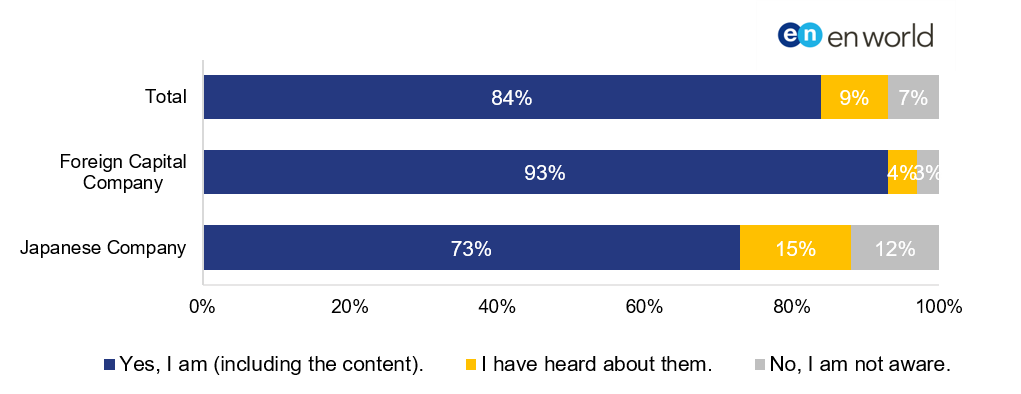
2.58% of foreign capital companies and 23% of Japanese companies checked references (Fig. 2)
We asked companies if they checked references when hiring mid-career workers after explaining the details; 41% answered “Yes, we do.” Scores were higher for foreign capital companies at 58% than for Japanese companies by 35%. (Foreign capital companies: 58%, Japanese companies 23%)
[Fig. 2] Does your company check references when hiring mid-career workers?
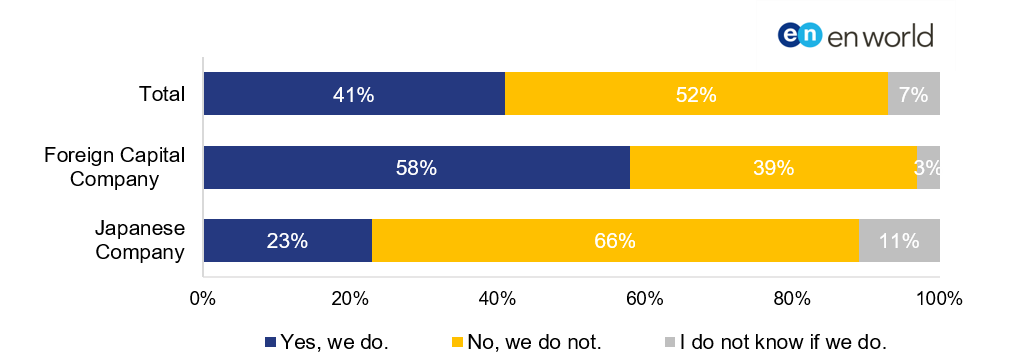
3.70% of companies answered that “the reference check results affect hiring decisions.” (Figs. 3 and 4)
Companies that answered “We check references” were asked how the information obtained in the process affected hiring decisions. 68% of companies responded to the survey “Significantly/ Somewhat." The rate was higher for Japanese companies by 19% (foreign capital companies: 62%, Japanese companies: 81%) despite the implementation ratio being lower than for foreign capital companies. The reference check results had a greater influence on the hiring decisions of Japanese companies.
[Fig. 3] Please respond if check references when hiring mid-career workers. How does the information obtained in the process affect your company’s hiring decisions?
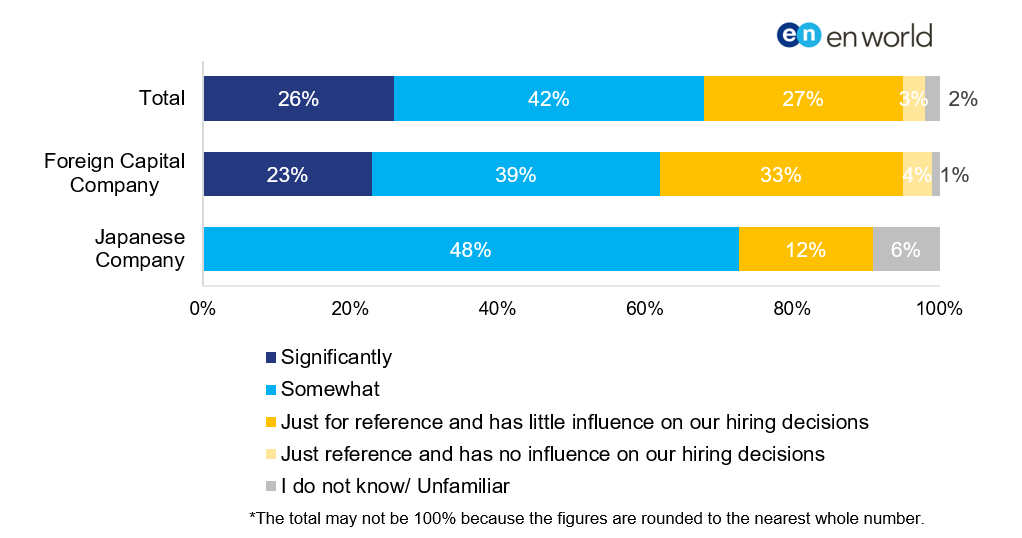
The most common time for companies to check references was after the final round of interviews at 62%. (Foreign capital companies: 65%, Japanese companies: 55%) 45% of Japanese companies answered “Before the final round of interviews” (after the first round of interviews/after the second round of interviews, and before the final interview). The scores for Japanese companies were higher than for foreign companies by 22%, and more Japanese companies checked references at an earlier stage in the selection process than foreign capital companies. (Foreign capital companies: 23%, Japanese companies: 45%)
[Fig. 4] When does your company check references?
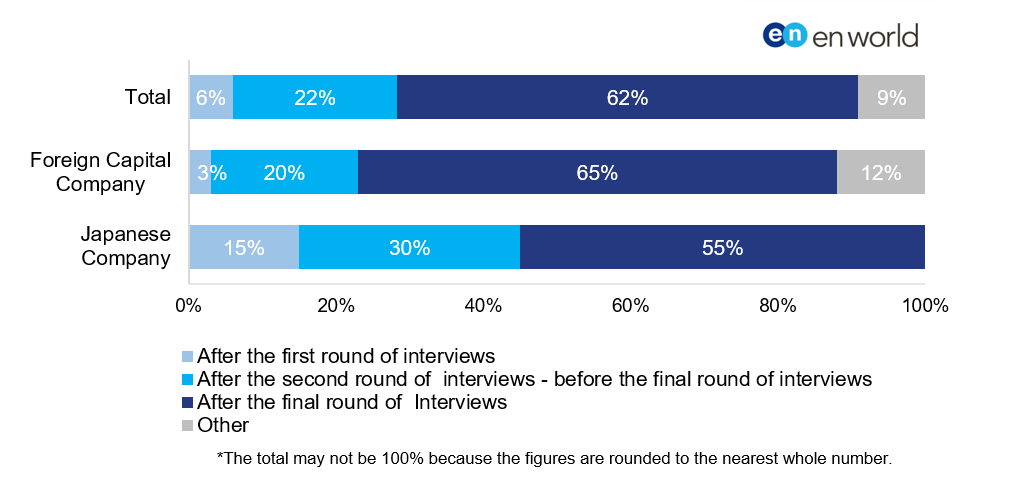
4.In about 50% of companies, recruiters or personnel in charge of HR check references. (Figs. 5, 6, and 7)
Companies that answered “We check references” were asked who made the checks. The most common response was “Personnel in charge of HR and recruitment” (foreign capital companies: 51%, Japanese companies: 39%) followed by “Use subcontracting or outsourcing services” (foreign capital companies: 26%, Japanese companies: 30%).
The most common method of selecting reference providers was by “Recommendation from the candidates” at 63%. (Foreign capital companies: 67%, Japanese companies: 52%) The scores for companies responding “We find the references based on our own approach” was higher for Japanese companies at 18%. (Foreign capital companies: 21%, Japanese companies: 39%) The most common numbers of references for a candidate were two at 58%. (Foreign capital companies: 61%, Japanese companies: 48%)
[Fig.5] Who checks the references?
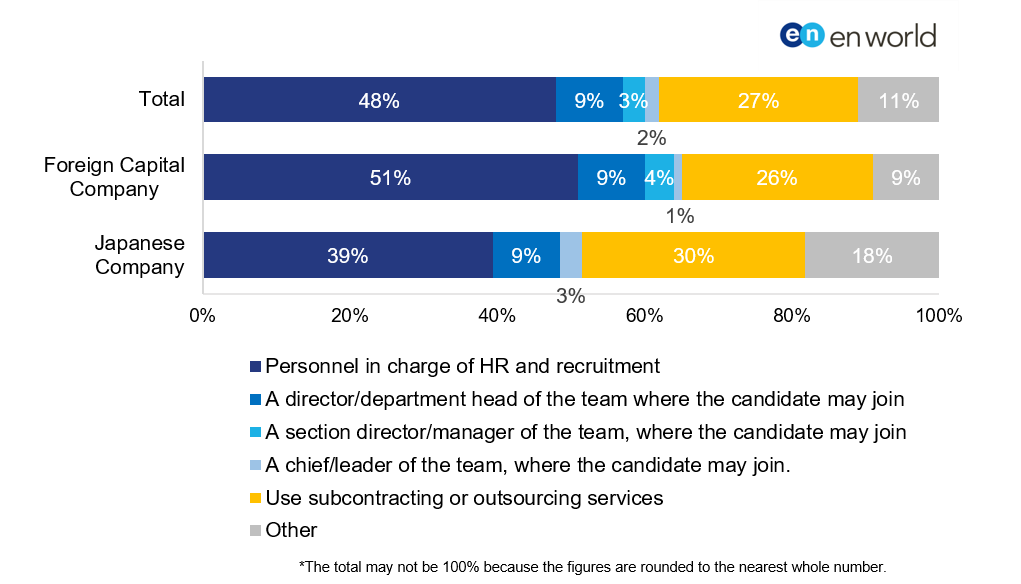
[Fig.6] How do you select the reference providers?
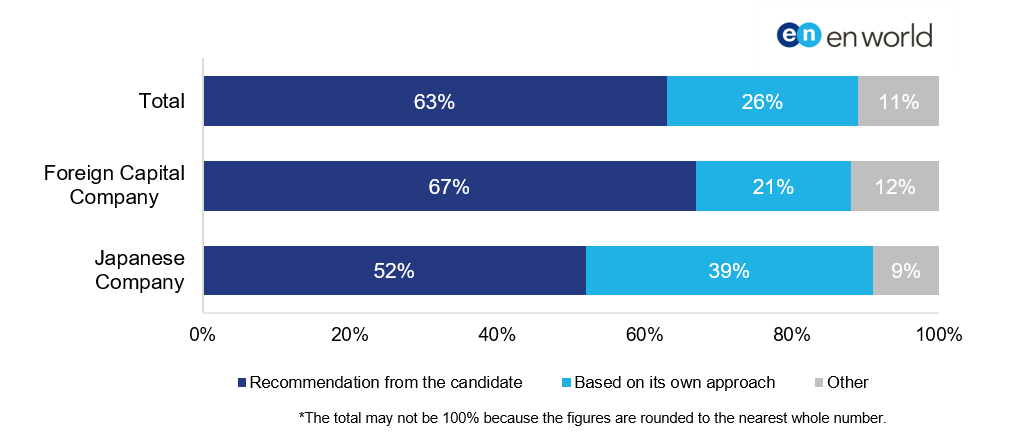
[Fig.7] How many reference providers do you contact for each candidate?
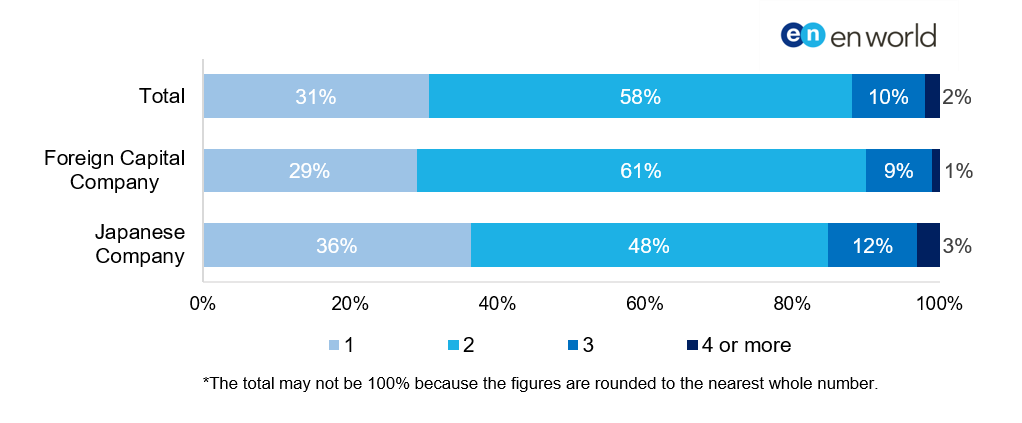
5.The greatest benefit of a reference check is “It helps verify the candidate's personality, skills, and competence provided during the interviews. (Fig. 8)
Companies that answered “We conduct reference checks” were asked what benefits they see in the process. The most common answer was that it helped verify the candidate's personality, skills, and competence provided during the interviews. Some of the comments are presented below.
[Fig.8] What do you think are the benefits of reference checks? (Multiple answers allowed)
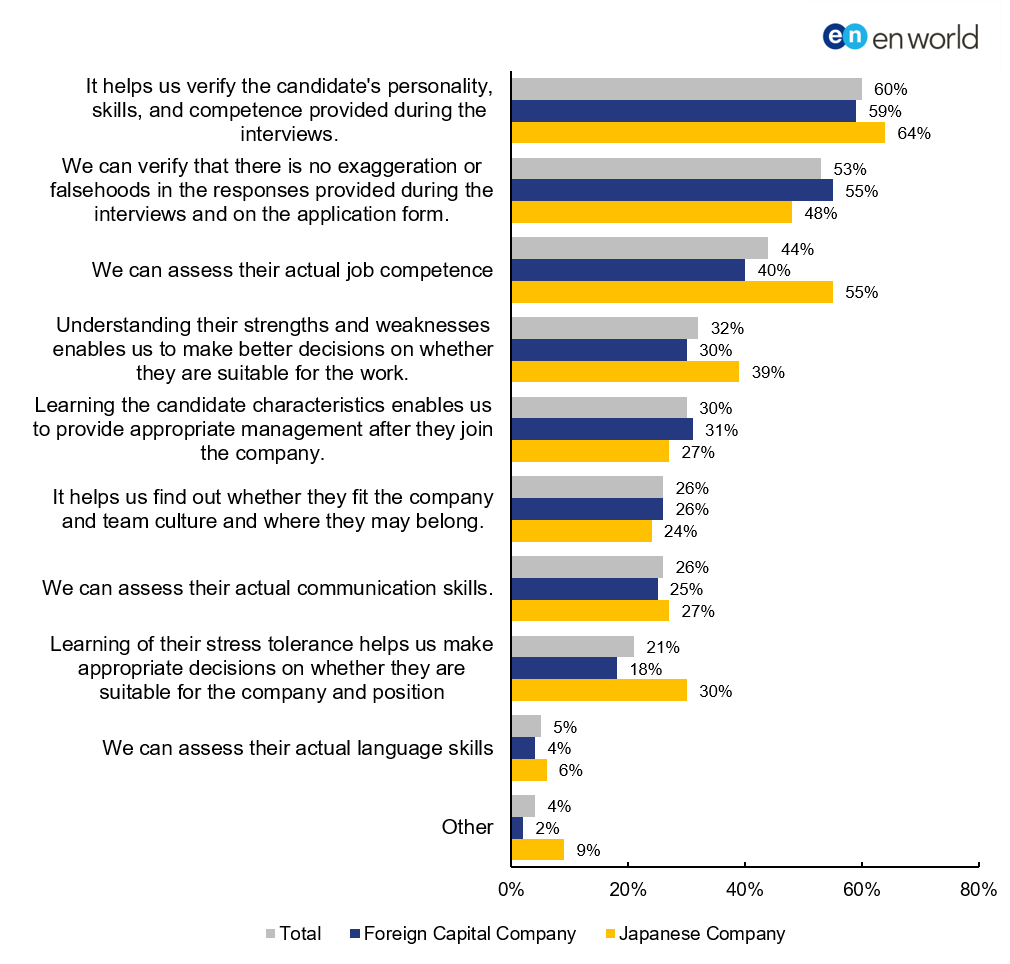
▼Open-ended comments regarding the benefits of reference checks
・I utilize it in creating personalized onboarding plans. (Foreign capital company)
・Reference-check information is limited but it is still better than not doing it. (Foreign capital company)
・We place great importance on referral recruiting or reference checking. Dismissals in Japan are strictly regulated. Hiring the wrong person can be fatal for start-up companies. (Japanese company)
・We do not need to make unfortunate decisions after they join the company. (Japanese company)
6.While in foreign capital companies, the most common answer to the question “What do you think are the disadvantages of checking references?” was “It is difficult to confirm the authenticity of the information,” and “Comments may differ according to the respondent’s attributes” in Japanese companies (Fig. 9)
Companies that answered “We conduct reference checks” were asked what they considered as disadvantages. The most common response by foreign capital companies was “It is difficult to confirm the authenticity of the information,” and for Japanese companies, it was “Comments may differ according to the respondent attributes.” Some of the comments are also presented below.
[Fig. 9] What do you think are the disadvantages of reference checks? (Multiple answers allowed)
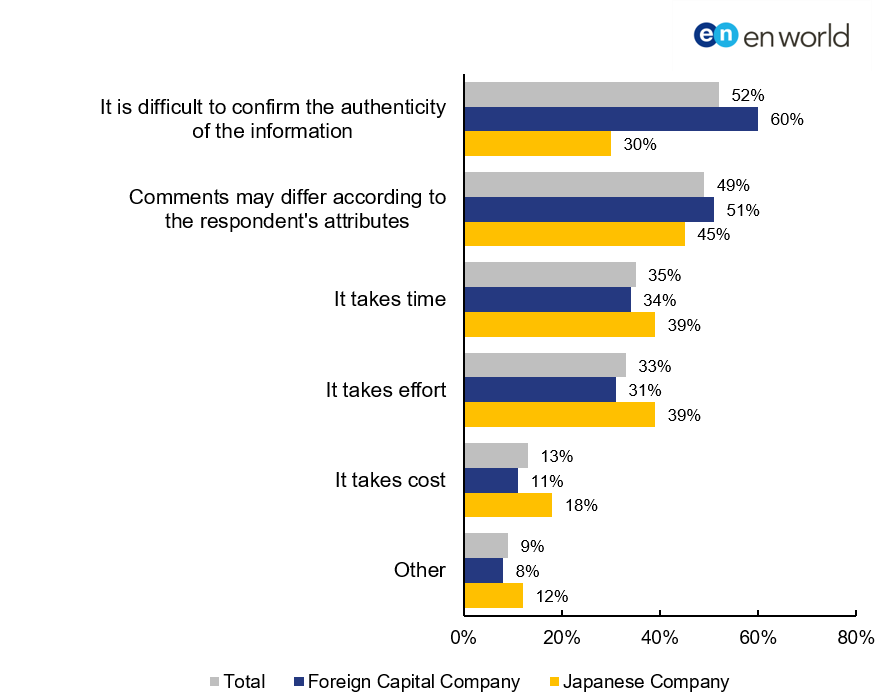
▼Open-ended comments regarding the disadvantages of reference checks
・Access is limited due to personal information protection concerns. (Foreign capital company)
・Some reference providers may be nominated because they only give positive information about the candidates. (Foreign capital company)
・Reference providers may not always be forthcoming about the negative aspects of the candidates. (Foreign capital company)
・It may change the candidates’ impression of the company. (Japanese company)
・If a candidate had less communication with people in their company, we may not be able to obtain frank feedback from the reference providers . (Japanese company)
・We cannot check references in a lot of cases due to a lack of reference providers. (Japanese company)
7.70% of companies that do not check references answered that they had no plans to do it. The most common reason was “The authenticity of the information is questionable." (Figs. 10 and 11)
Companies that answered “We do not check references” were asked if they had plans to do so in the future, and 71% answered “No plans/ Not interested." (Foreign capital companies: 59%, Japanese companies: 78%) We asked companies that answered “No plans/ Not interested” for the reasons. The most common answer was “The authenticity of the information is questionable."
[Fig. 10] Please respond if your company does not check references. Do you have plans to do so in the future?
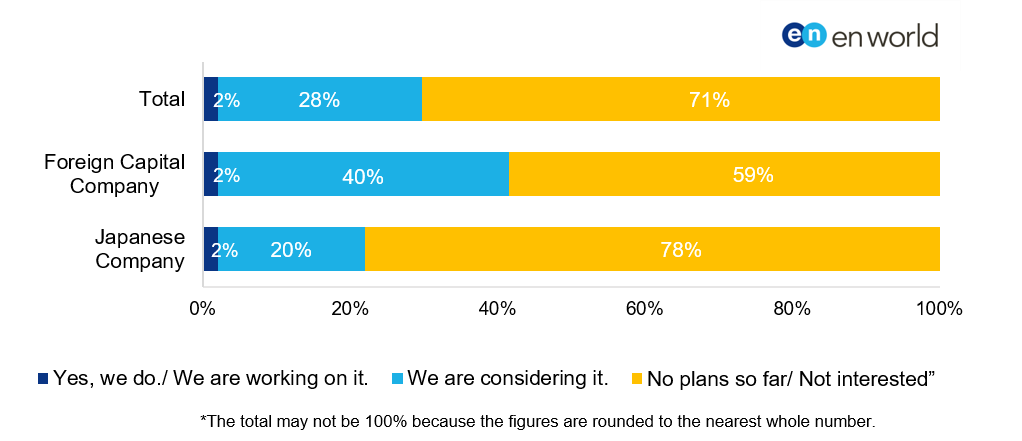
[Fig. 11] Please respond if your company has no plans to check references or has no interest in it. What are the reasons behind your answer? (Multiple answers allowed)
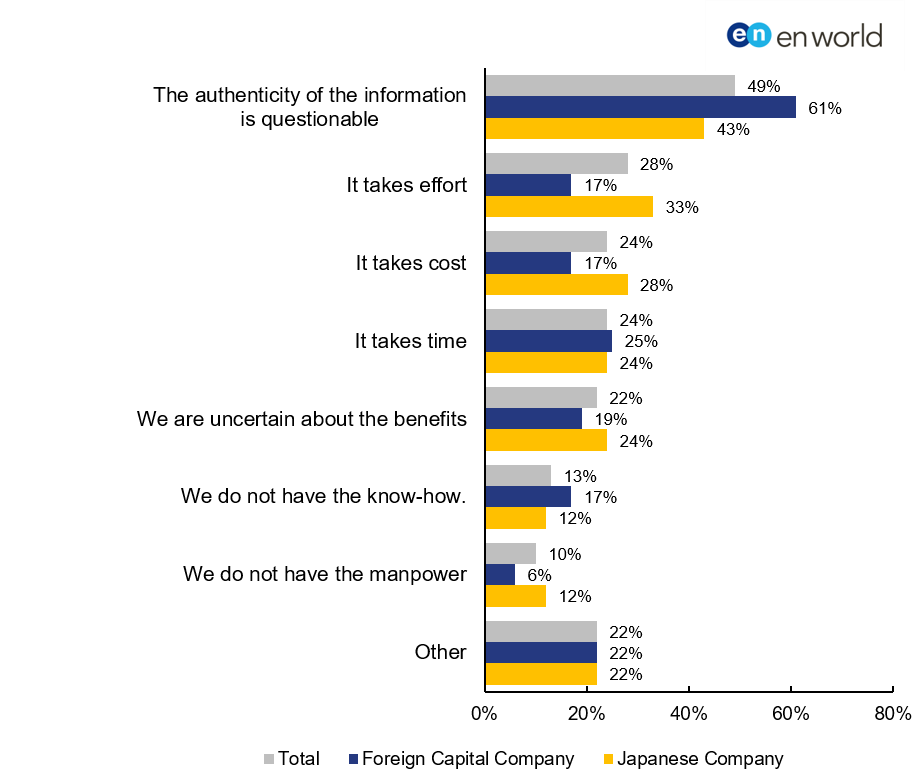
------------------------------------------------------------------------------------
[Outline of the survey]
Survey method: Online survey
Area: Japan
Number of valid answers: 303 companies
Period: January 15-21, 2021
Respondent attribute: Foreign capital companies 52%, Japanese companies 48%
------------------------------------------------------------------------------------
“ASHIATO”, a reference report service that visualizes the “record of achievements." (https://ashiatohr.com/)
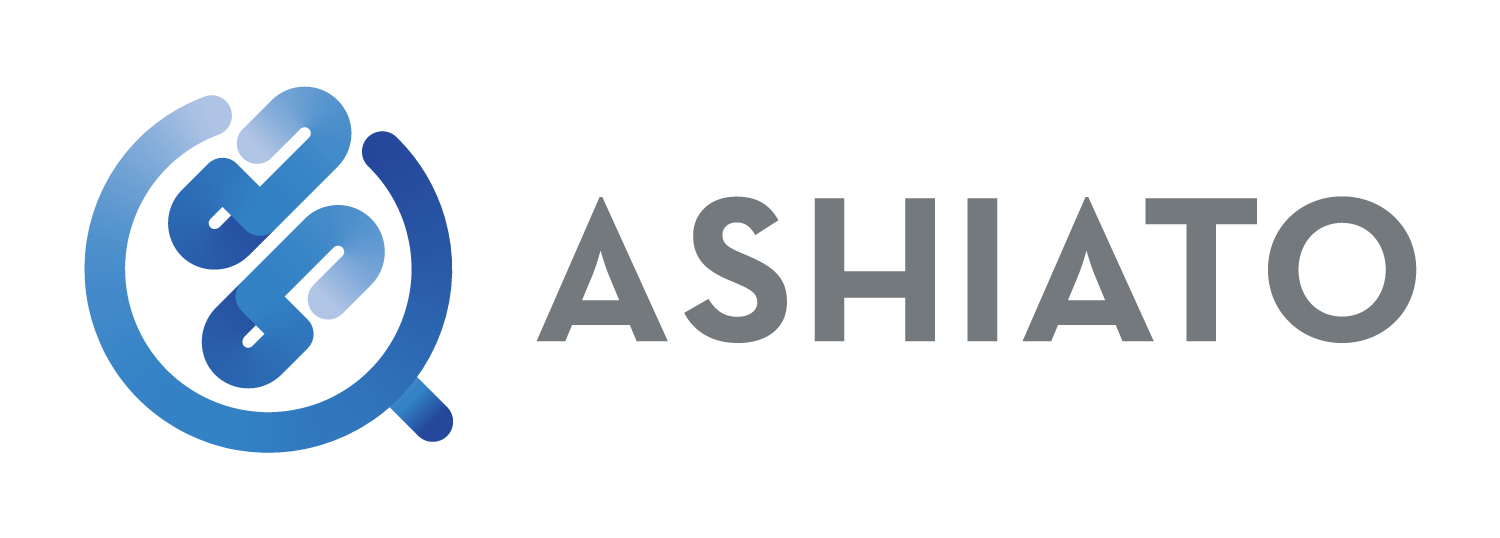
ASHIATO”, is a new reference report service provided by en world Japan K.K with the aim of visualizing the record of achievements by obtaining references from the candidates’ past and current superiors and colleagues. This new service is different from conventional reference checks that focus mainly on finding the negative aspects of candidates because of its feature of visualizing not only the employment hurdles but also tips for maximizing work performance.
ASHIATO provides a one-stop all online service for companies from recruiting human resources that best match their needs to the utilization of new manpower.
Business contact: Kevin Naylor(kevin.naylor@enworld.com)
About en world Japan (https://www.enworld.com/)
en world Japan is a recruiting firm established in 1999 specializing in global human resources with offices in four countries in the Asia-Pacific region. We specialize in supporting Foreign Capital Companies and global Japanese companies in recruiting human resources for middle to high level positions. We help companies with recruitment and job seekers with career changes from every angle by staffing full-time workers, contract professionals, and executive human resources and providing recruitment process outsourcing solutions.
Contact information for inquiries about this news release
en world Japan K.K. PR representative
Email : enworld-pr@enworld.com
Tokyo Square Garden 12F, Kyobashi 3-1-1, Chuo-ku, Tokyo 104-0031
